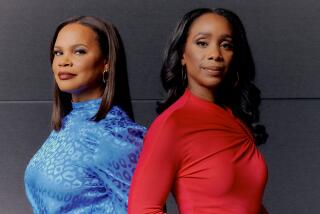Anchors Say Flowers Story Bewitched Media
- Share via
NEW YORK — The name of Gennifer Flowers hung like Banquo’s ghost over a rare joint appearance Sunday by the five major TV anchors--Tom Brokaw, Peter Jennings, Dan Rather, Bernard Shaw and Jim Lehrer.
During the New Hampshire primary, ABC anchor Jennings said that he had been struck by the fact that “everybody in the press seemed to be interested in Gennifer Flowers and everybody in New Hampshire wanted to know about the economy.” Jennings said the media had been distracted by Flowers’ allegations of having an affair with Arkansas Gov. Bill Clinton but that the coverage of issues had improved after that.
In fact, the anchors seemed as haunted by Flowers as Macbeth was by Banquo, whom Macbeth had ordered killed. Flowers sold her story to a supermarket tabloid, alleging that she had a long affair with Clinton--who denies the allegations.
Lehrer, co-anchor of “The MacNeil/Lehrer NewsHour” on PBS, said that his own news judgment had been overwhelmed by the intense, immediate coverage given to the Flowers story by local stations and other TV programs. But Bernard Shaw, the Cable News Network anchor, contended that the networks were “duty-bound” to cover Flowers’ allegations about a presidential candidate.
The hourlong forum on presidential campaign coverage at the Four Seasons restaurant--sponsored by the Joan Shorenstein Barone Center on Press, Politics and Public Policy at Harvard University--was an exercise in “self-indictment and self-acquittal,” said Bernard Kalb, a former network reporter who is now a media critic.
“I think we’re in trouble; we are losing our credibility,” Lehrer said. TV viewers “don’t understand why we ask nasty questions.”
The viewer who “has a grandmother . . . who is about to spend $50,000 to go into a nursing home” and wants to know about health care costs doesn’t understand why reporters focus on questions about politics and sex, he said.
The public identifies the media with the powerful and “don’t understand that we are covering this convention for them,” Lehrer said.
But the anchors also gave themselves good marks in some areas. Rather of CBS said that he thought network reporters had been asking more tough questions of politicians this time, compared to their performance during the 1988 campaign. He disputed the notion (advanced in studies by think tanks such as the Barone Center) that the networks only covered the campaign in “sound bites” of 7.8 seconds.
The anchors fielded questions ranging from whether politicians manipulate newscasts to whether the networks are right to scale back coverage of political conventions this year.
More to Read
The complete guide to home viewing
Get Screen Gab for everything about the TV shows and streaming movies everyone’s talking about.
You may occasionally receive promotional content from the Los Angeles Times.






